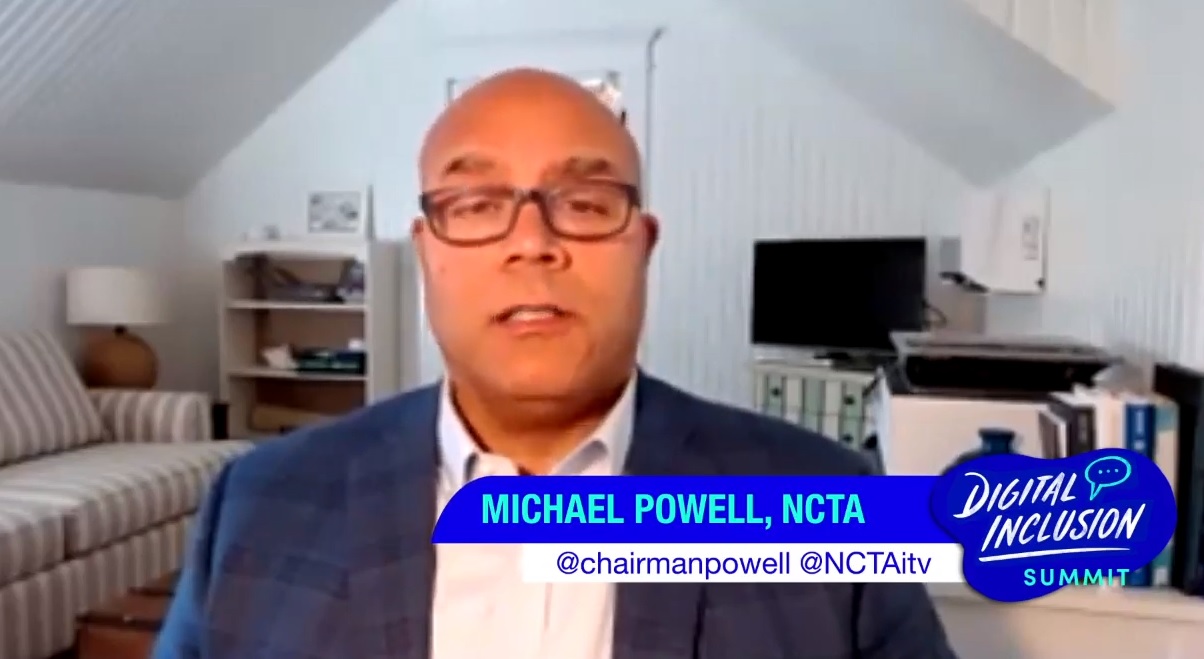Powell: Broadband May Need to Be Part of Social Safety Net
Suggests government policies must recognize essential nature of access

The smarter way to stay on top of the multichannel video marketplace. Sign up below.
You are now subscribed
Your newsletter sign-up was successful
NCTA-the Internet & Television Association President Michael Powell said that when it comes to universal broadband service, it is always hard when you get to the last portion of the population still on the other side of digital opportunity, so government needs to step up funding, including perhaps making broadband service part of the social safety net, like SNAP, the Supplemental Nutrition Assistance Program.
But he points out that there was the same issue with other infrastructure, whether electricity or indoor plumbing or roads.
Powell was speaking at the Hispanic Technology & Telecommunications Partnership virtual Digital Inclusion Summit Thursday (Dec. 3), which was focused on the importance of getting broadband to that last portion, which over-indexes for minorities and the poor.
Related: Trade Groups Press Hill for Broadband Funding
While he said broadband has probably been the fastest-deploying technology in history, so there is much to celebrate in the number of people who have been reached, and with what speed. But he said that because of the economics of infrastructure build-outs, it gets "really hard" to get to those last folks, and cited two distinct problems:
First is the people who don't have the infrastructure to begin with, which he calls an economic problem of enormous proportion. "Put simply, if I have to run a wire between two homes that are three hundred miles apart to pick up two customers paying $50 a month. That is a heinous economic equation that is just insurmountable by most economic and financial models."
Related: Powell Says Justice Is Businesses Business
The smarter way to stay on top of the multichannel video marketplace. Sign up below.
He said the government has to be a partner in that effort because there are only two ways to solve that problem, which is either find more revenue to offset the costs of reaching those people, or lower the cost through technology or some other way. But he said the big issue remains the "scary" sums of money needed to get to full digital inclusion.
The second problem is adoption and affordability. He said that problem is more complex than the first. On adoption, he said he is surprised by the people who say they don't value the service enough to purchase it. On affordability, he said that while he thinks the rates are "generally pretty good," they are expensive for some people, which affects urban poor and large families with limited disposable income. But you also have to have devices.
Finally, he said, there is another problem: The skills required to negotiate the internet. "We have to be committed to developing the skills and education necessary to take full advantage of the internet."
Powell said the FCC does a lot in terms of funding, but Congress needs to do more.
"Is broadband going to be part of the social safety net," he asked. "If we believe broadband is an essential service, we are going to find a way to include some sort of support for those who are down on their luck or out of work or are struggling with the expenses associated with the service."
Powell agreed that access to technology is a civil rights issue.
He said there is no view of the future that is not rooted in technology.
"In our world, in cable, we are working on tools that folks need to get in the game," he said. "But how well they play in that game is going to depend on attacking the chronic problems that stem from racial and gender equality...I want our society to see this as a big, comprehensive problem, part of the systematic racism, part of the growing equality work."
Contributing editor John Eggerton has been an editor and/or writer on media regulation, legislation and policy for over four decades, including covering the FCC, FTC, Congress, the major media trade associations, and the federal courts. In addition to Multichannel News and Broadcasting + Cable, his work has appeared in Radio World, TV Technology, TV Fax, This Week in Consumer Electronics, Variety and the Encyclopedia Britannica.

